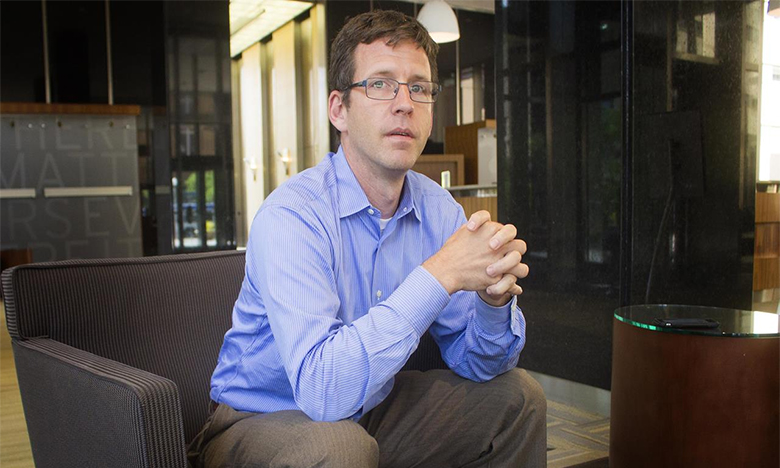This is a good time to talk politics, Scott Burns says, because he finally feels free to speak his mind. “Working with 1,000 government clients, I kept my mouth shut,” the founder of GovDelivery says with a laugh. The tech company handles digital communications for local, state and federal governments, most famously driving millions to healthcare.gov during the Affordable Care Act rollout. In September, Burns sold the public company after 17 years for $153 million — although his share was a fraction of that.
Since then, the 41-year-old has been anything but quiet. This spring, the Minnesota native joined the Saint Paul Innovation Cabinet, a group working to add city tech jobs that Saint Paul Mayor Chris Coleman says was inspired by a conversation with Burns. Son of a staunch Democrat father and school board mother, Burns is marrying his business experience with a lifelong love for public service. He joined the boards of the Saint Paul and Minnesota Community Foundation and the Saint Paul Area Chamber of Commerce, where he worked with others to build a minor league ballpark, a new metro line and a soccer stadium. “Scott typifies that kind of business leader who doesn’t just focus on their success, but really understands their success in the context of a successful community,” says Coleman, who this year declared February 27 “Scott Burns Day” in honor of his civic work.
"HE’S GOT THE STREET CRED OF HAVING RUN A STARTUP … [AND] HE’S GONE THE EXTRA MILE OF GIVING BACK TO THE NEXT GENERATION."
That work includes Burns’ latest project, the 20-story former Ecolabs building, which he and other investors purchased to fill with tech and innovation companies. The culmination of a years-long strategy to bring new jobs downtown, it’s an endeavor Coleman calls “huge” for the city’s ambitions. Sitting in the building’s lobby, Burns challenges the stereotype of an Ivory Tower businessman, with his thin frame and glasses that cut a Dana Carvey–like figure. “Business already is a force for good in millions of people’s lives,” says Burns, who has made millions but says his net worth doesn’t approach eight digits. Still, the problem is a capitalist system that “has not delivered the kind of returns it should for people who are struggling,” he says, as evidenced by an ever-widening income gap. Burns is striving to be one of the good actors — someone for whom the bottom line is only one part of the equation.
He joins a cohort of affluent, often left-leaning business leaders instigating civic change across the country. Some have sought elected office, such as J.B. Pritzker, the Chicago billionaire running for Illinois governor. Others champion particular policies as rumors of political ambitions swirl — folks like Facebook founder Mark Zuckerburg, now in the midst of a nationwide listening tour, or Aspiration cofounder Joe Sanberg, a startup guru who has been touting tax credits for low-income families while traveling through California and Democratic circles. Each claims different motivations for engagement, but virtually all are united in their frustration with gridlocked state and federal legislatures.

